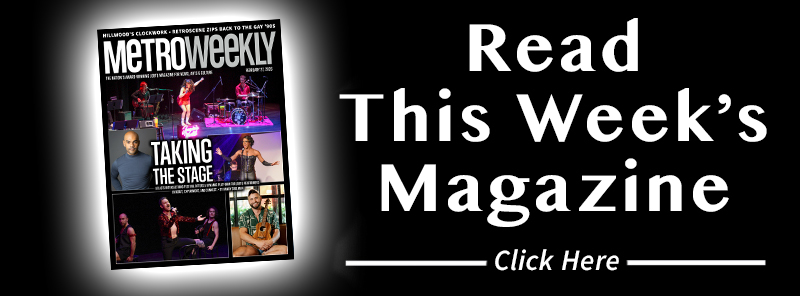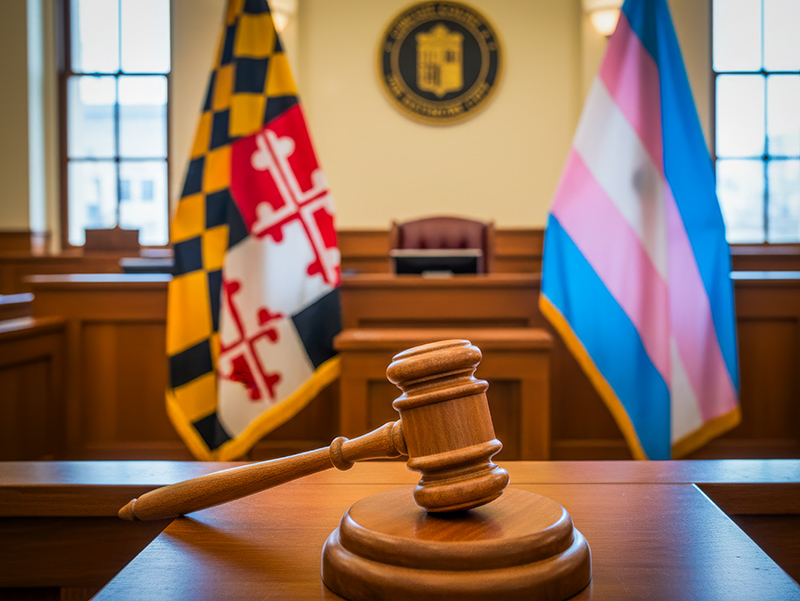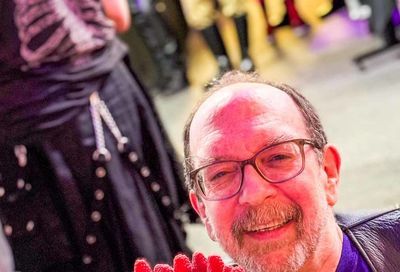The Bulwark’s Tim Miller Sounds Off on Trump and the GOP
Gay ex-GOP strategist and The Bulwark host Tim Miller on leaving the GOP, LGBTQ rights, America’s hard-right shift, and the Epstein scandal.
By John Riley on August 12, 2025 @JRileyMW

“I was really into politics at a very young age,” says Tim Miller, host of The Bulwark Podcast and an MSNBC political analyst. “I can’t remember what they were called, but you’d get those kid magazines about politics that would come to your school, and I remember always really being drawn to them, and reading them and wanting to know more. I always knew lots of weird facts about politics and geography as a little middle school nerd.”
Raised in St. Louis until fourth grade, when his family relocated to Littleton, Colorado, Miller became enmeshed in conservative politics at a young age, taking various campaign jobs throughout his career as a former Republican strategist. He jokes that his success at handicapping political races dates back to the 1992 election, when he won a $1 wager after betting his grandmother that then-Arkansas Gov. Bill Clinton would unseat sitting president George H.W. Bush.
Miller’s fascination with politics was entirely self-driven. As a teen, a neighbor connected him with Colorado State Treasurer Bill Owens, who was running to be governor. The 16-year-old volunteered for the Owens campaign throughout the summer of 1998. Recalling the night of Owens’ 8,100-vote victory, Miller says his experience made him fall in love with political campaigns all the more.
“They called the race at 2:00 or 3:00 in the morning,” he says. “I remember being there and the excitement of that call, and…going on stage with [Owens]. I was already a super politics nerd, but that was a very formative moment.”
Politics has continued to influence the 43-year-old’s career. He worked on the 2008 and 2012 GOP presidential campaigns John McCain and Mitt Romney, parlaying that experience into communications and public relations positions, focusing on rapid response and opposition research.
Miller says that one of the features of politics that has been lost in recent years is the ability to befriend people of differing political beliefs, something he once found easy to do.
“I had a job doing basically anti-Obama rapid response stuff,” he says. “One of my closest friends, Lis Smith, had that job for Obama, and she was later a senior advisor to Pete Buttigieg’s campaign. We would just shit-talk each other all day on Twitter and through the media, and then go party at night.”
Now, he says, “you can’t even measure the degree to which it’s different. Polarization has infected everybody in the entire country.”
Miller was initially attracted to the GOP by the ideas of “compassionate conservatism,” so-called “green” Republicanism, and pro-immigration policies. He soured on the party as its more populist, isolationist voices took hold, creating the perfect environment for an anti-establishment, norms-breaking personality like Donald Trump to thrive.
Trump’s takeover of the Republican Party, essentially by beating it into submission, led Miller to disaffiliate from the Republican Party. He no longer identifies as Republican, deeming the task of reclaiming the party from Trump “hopeless.”
That sentiment was particularly strong following the January 6, 2021, riot at the U.S. Capitol, where pro-Trump demonstrators attempted to prevent Congress from certifying the 2020 election results.
“The fact that Donald Trump could try a coup, and that everybody was going along with it, just made me feel like this was not a party that I was ever going to be able to support again,” he says. “I’m never voting for anybody that was for Trump, so that’s going to make it pretty hard to be a Republican.”
Over at The Bulwark, Miller often calls upon his experience as a former Republican operative to analyze how America’s two major political parties are shifting and changing, pinpoint and explain cultural and political trends, and keep listeners and YouTube viewers up to date on breaking news developments.
Throughout our Zoom conversation, we discuss — and sometimes spar over — topics from the historical (Newt Gingrich’s role in accelerating political polarization) to the strategic (the flaws in Democratic campaign messaging and strategy) to the hypothetical (how the outcome of the 2024 election could have been altered).
Despite holding a center-right political viewpoint and moderate-to-conservative impulses when it comes to policy, Miller remains an anti-Trumper, seeing the president as a stalking horse for fascism and a threat to our political system, hiding behind the slogan “Make America Great Again.”
Miller, who lives in New Orleans with his husband of seven years and the couple’s adopted daughter, came out later in life, after spending his teenage years privately fretting about being ostracized for being gay. He has found, in practice, that most people in his personal and professional circles take no issue with his sexual orientation — a potential signal of how far gay acceptance has progressed over the past twenty-five years.
“I remember thinking, as a teenager, ‘How would it work to be gay? What would that look like?'” he says. “And thinking, ‘Well, I couldn’t have a wedding, and even if I could, nobody would show up.’ The funny thing is that nobody refused to come to our wedding because it was a gay wedding. But several people did not come because I spoke out against Donald Trump.”

METRO WEEKLY: When did you first know you were gay, and can you tell us a little bit about your coming out story?
TIM MILLER: I had a pretty decent sense in high school. I mean, I went to an all-boys high school, so there was a little bit of patty cake going on there, but I was a really late bloomer. I really didn’t feel like I even knew myself until I was twenty. But I knew in college, and I had a few closeted encounters with dorm mates, but I had convinced myself that I could fake being straight.
I guess I’m technically bi — I don’t identify as bi, and maybe this is too much info for the Metro Weekly audience, but the equipment works. So I convinced myself that [being straight] was going to be an easier path for me. Sort of, “This is fine. It’s not really my preference, but life is hard.” So that was how I rationalized it to myself throughout college. I’d had one girlfriend post-college and who was wonderful, so you can see how I talked myself into it. I had a realization that [living that way] was not right around the time I moved to Iowa, and I was away from that girlfriend, and I just thought, “I’m just attracted to men. That’s the reality.” I was trying to figure out how to deal with that. I bought my first pair of “gay jeans” when I went to get a pair of skinny jeans at a mall in Des Moines, to test that out. A couple of people in the campaign did notice that, and made comments about it, but I was just working it out myself.
Then I moved back to D.C. after the campaign, and there were some gay people in the PR firm I worked at, including my now-colleague, Sarah Longwell. I had never really been around that many gay people. I went to Catholic school, and I went to GW [George Washington University], but I blocked it out. And then I was in Republican campaigns. So it was the first time I really started to picture what my life would be like as an openly gay person. While I was starting to picture that, the Larry Craig scandal happened. I remember watching his interview with Matt Lauer with his wife next to him and being like, “I’m not going to be the sad old man yanking it in an airport. I will not let myself do that.”
That was the final kick in the ass I needed. I came out to one of my work colleagues. He was wonderful. He gave me Andrew Tobias’s book, The Best Little Boy in the World, which I read that night. By the weekend, I was at the gay bar. I just decided, “This is right.”
MW: That’s an amazing coming out story.
MILLER: Well, we didn’t even get to Thanksgiving with the family! Honestly, that one’s maybe for the dramatization of my story. If I get sent to El Salvador, we can include the “white, raucous drunk family Thanksgiving” coming out, just a classic story, straight out of the movies.
MW: Oh, really? How so?
MILLER: I mean, it was just weird. I came out to my parents drunk. Everybody was drunk at Thanksgiving dinner and screaming. Catholic parents screaming at each other and storming out of the house and all that. My parents are wonderful and came around, God love them.
MW: Hey, you’re talking to the kid who came out to his parents via email because he didn’t want to talk face-to-face.
MILLER: There you go. That was maybe what I should have done — given everybody a few hours to process rather than just be like, “Hey, pass the pumpkin pie. I’m gay now.”
MW: What was it that first attracted you to the Republican Party?
MILLER: The cliche, cheesy answer that is also just true is I was drawn to the idea of free markets and free people, like a libertarian element to politics. I think it’s the most fundamental thing that’s changed about the Republican Party. But at that time, the party was very much about American exceptionalism, with America as the shining city on the hill. We should welcome people who are coming to this country. The role we play in the world is a net-positive.
MW: Were the things you were drawn to in the party specific to Colorado Republican politics or national politics? Because I’d imagine if we talked to a Republican who is our age from the Deep South, the reasons they’d say why they favor the GOP might be a little different.
MILLER: Yeah, maybe. I didn’t come from evangelism. Like I said, my parents were very Catholic, but they weren’t really involved in politics. I came up very much in campaign politics. I was formed in politics by these Colorado Republicans with a little bit of libertarian streak. I care about the environment — there was a lot of a “green” Republican platform that was popular back then, so it’s possible that I was formed by that.
I should also say, in candor, I really liked George W. Bush in 2000, and he’s not from Colorado. I wanted to do a project –- and it’s never come to pass, maybe I’ll do it someday — that revisits the “compassionate conservatism” slogan, and interviews everybody involved with it. “How much of this did you guys believe and was real? How much was it a slogan?” Because Bush obviously didn’t end up living up to it in a number of ways, but that brand of Republicanism was attractive to me.
Again, just going back to the things that have changed about the parties, the immigration stuff — I mean, Colorado has a huge Hispanic population. I was really drawn to this “Statue of Liberty” vision of America and of American greatness.
When I was coming into politics, there were two major things that happened. One is the Elián González incident, which is the Clinton administration sending in fucking guys with guns to send this child back to a communist country. In retrospect, it’s a little bit more complicated, but as a young kid, I was thinking like, “Fuck these guys. This kid is trying to flee communism. We should be welcoming that. Why are we sending jackbooted troops with guns in to send him home?”
On the heels of that, W runs on a very pro-immigration reform, welcoming the immigrants. He’s speaking Spanglish. I went to his first event in Colorado, and he is doing really hacky Spanish on stage to demonstrate that he cared about that. So, I don’t know. I was drawn to that and there’s some issues where I’ve moved left or changed my view on, but that is the core thing that Trump really just totally abandoned, and that was pretty central to what appealed to me about the Republicans initially.
MW: The Democratic Party is reportedly going to perform an autopsy, but they’re not going to examine Biden’s decision to run for re-election, the timing of his exit from the presidential race, or the Kamala Harris campaign’s strategy. Instead, they’re going to talk about “the actions of allied groups,” which to me sounds like it’s going to be a finger-pointing exercise of blaming trans people, the
“Uncommitted” movement and Gaza protesters, supporters of DEI, and others for last year’s loss. How seriously can we take this autopsy if they’re not going to examine those three “elephants in the room,” so to speak?
MILLER: Yeah, I think it’s even stupider than that. When they say “outside groups,” I think they’re going to talk about what the super PACs did and how they spent their money rather than the identity groups. I don’t know that, but that’s what I suspect, because there’s a big internal rift. If you’re on any Dem-aligned group chats, the internal fighting over the fucking super PACs strategy versus the campaign strategy is vicious, and it’s also stupid and pointless because that was not the reason why the Democrats lost.
Look, I worked on that 2013 autopsy that the Republicans did after Mitt [Romney] lost. Donald Trump used it for toilet paper, and went on and won anyway. So I think that an autopsy is pretty stupid, just as a general project. We’re not as good as we think at projecting out how things will look four years from now, three years from now.
Imagine trying to do a strategic autopsy on how to handle communications based on what happened in 2024. By 2027, with AI, with the proliferation of all these independent media outlets, the media environment is going to be so different in 2028 than it was in 2024. So what is even the point of doing an autopsy and looking at your failure?
“Oh, we didn’t go on enough ‘bro’ podcasts.” Well, no shit, you didn’t, so maybe you should do that next time, but that’s obvious, and it doesn’t require a memo.
I think that the main thing that the Democrats need to reflect on is that the party is as unpopular as it’s been since 1990, if you look at polls, because a lot of Democrats don’t like their own party. But, really, if you just look at the successful Democratic candidates over the past 30 years in my life, it’s Bill Clinton and Barack Obama, who both ran as outsiders against the party, with Clinton running from more of the center, and Obama running a little bit from an ideological mushy point of view, but from the left on Iraq, and from the center in terms of tone. Then Trump successfully wins twice, running against the party, running against the establishment.
People don’t like the Democratic Party establishment, and the main learning from an autopsy should be that the American people don’t like this institution. Maybe that’s unfair, but life’s unfair. If the Democrats are going to be successful, they need to find ways to distance themselves from the Clinton-Biden-Harris era.
MW: Do you think there is a way that Kamala Harris could have won, or was this a “vibes” election where the result was baked-in?
MILLER: The vibes are really bad. I mean, I think that the things that could have been different were: Joe Biden could have gotten out of the race earlier, and Joe Biden, even more importantly than that, could have provided a framework for Kamala to distance herself from him.
Honestly, I think that’s his core sin, this notion that Kamala needed to be loyal to him and he had to speak at the convention. He needed to do what W did after he left office, which is like, “I’m going to paint, and if you guys want to shit on me and shit on the Iraq war or whatever, you do it. Do whatever needs to be done.” That’s what Biden’s mindset needed to be. Kamala distancing herself from him might’ve helped.
Also, Kamala was set up to fail from the start by being given these shitty assignments like “fixing the root causes” of illegal immigration. Okay, great, maybe she should have been in charge of fixing poverty and the human desire to sin while she’s at it. She was given a really bad portfolio. She was not set up to succeed.
I think that she ran as good a campaign as she could have within all those constraints, but she needed to be more loose and unhinged and be herself, and offer something that felt different from, “I’m just a generic Democrat,” because I think that most voters just processed her as a generic Democrat. So I don’t know. I wish it could have gone differently. I think it possibly could have gone differently, but the vibes were really bad, and that was partially inflation and partially Biden.
MW: Andrew Sullivan recently wrote an op-ed for the New York Times where he argues that what he calls the “queer liberation” messaging turned ordinary people off.
MILLER: Oh, my God. You’ll get me in trouble. Andrew’s mad at me.
MW: We often hear that critique from conservative LGBTQ people, marketing themselves as the “normal gays.” To me, just from a strategic standpoint, unless you are part of, or are super-immersed in, the LGBTQ community, most voters don’t make the distinction, so the rhetorical “queer-bashing” is ultimately harmful to the whole community. I also believe many Americans just think, “Gay, trans, it’s all the same, whatever. I hate it.”
MILLER: Yeah, I don’t know about that. So, there’s an element of the Andrew critique that I begrudgingly, very slightly, agree with, and then there’s an element that I completely reject. On the agreement side, I don’t think that regular voters know or care or understand what queer liberation theory is or any of that. After the successes around marriage, I feel like the gay activist community was looking for other stuff to engage in. There was a lot of legit stuff — non-discrimination and all this — but it did start to seep into having other cultural demands that just bugged some people. I think back to the Democratic 2024 candidates all having their pronouns in their bios. Everybody knows what Kamala Harris’ pronouns are. It’s like, “Why is she doing that?” It feels inauthentic and weird.
I think that people with kids feel there was a change from 2017, when it was, “Everybody, love is love. Gay marriage is good,” to 2020, when your second-grader’s getting an assignment from school about the gender binary. People begin to think, “Okay, some of this stuff maybe should be reserved for college struggle sessions.” I think that really did annoy some people. I even hear it from pro-gay parents who are like, “Why is all this theory stuff getting pushed down into schools?” Is that the reason why Kamala lost? No, but it definitely didn’t help.
The thing that bugs me about Andrew and others making that argument is, at the same time this is happening, starting in Florida, there’s an effort to erase gay people from schools. Simultaneously, while parents in suburban districts and blue cities in red or blue states are not really loving some of the curriculum changes, in red states and red districts teachers are being forced to put away the pictures of themselves and their spouses for fear of running afoul of the law.
Andrew and others tried to minimize “Don’t Say Gay” as part of their rationalization for supporting Ron DeSantis. But my child in a school in Florida, as the law was written, would be in danger of violating the rules if they did a family tree, right? If a teacher gave an assignment in class that included telling the students that, “Oh, well, Toulouse has gay dads,” and one of the other students’ parents is crazy, they could sue the school district over that under the “Don’t Say Gay” law. That’s an insane law and it’s something that is going to cause real harm to kids in red states and districts, not to mention the really aggressive and grotesque anti-trans laws that are targeting folks in those states.
I think both things are true. There’s a little bit of overreach in ways that I think hurt politically, but also the backlash has been extremely regressive, and I feel like Andrew and others try to minimize that sometimes, because their more acute fight is with liberal/left LGBT activists they don’t like.
MW: Do you believe that LGBTQ Americans should be more concerned about, for instance, the implications of Project 2025 or initiatives like it?
MILLER: I’m worried for trans folks across the board. I mean, trans people getting kicked out of the military is already happening. This is horrible. I think that there’ll be more crackdown on trans Americans, particularly in red states across the country. I’d be worried about that.
Like I said, kids in red states and districts that come from LGBT families, or, as you get into the older grades, are gay themselves, I think that we’re backsliding in a real way, and some of them are going to be under threat. If you’re an LGBT immigrant, I think you’re in a really bad place right now in this country. If you are not yet a citizen and you have any other type of [immigration] status, and you’re LGBT in this country, particularly if you flee from a country where there’s even more aggressive discrimination against gay people — I’m very worried about them, and I think that people should focus on protecting them.
I like to say this because I hear it a lot from my gay friends. I’m not worried about gay marriage being overruled. I just don’t see it on the Roberts Court. I just don’t. I’ve been wrong about things before. So I’m not saying it’s a zero percent likelihood, but I think it’s less likely. I think that there is now, thanks to the bipartisan bill that he passed under Biden, protections for people who already have marriage rights. So that is the one thing that I hear that I think is probably quite a bit lower on the threat list than the other stuff.
MW: I’ll just tell you personally, I think they’re going to overturn it, but I think the Respect for Marriage Act has those protections for same-sex couples and families —
MILLER: Existing marriages will be protected, and then in blue states, people will be able to marry.
MW: Yeah, it’ll be Roe 2.0, but I have very little faith in any court upholding Obergefell at this point. I think judges will rule based on their personal feelings, screw any legal precedent.
MILLER: No, that’s fine. We’ll see. We can do a gentleman’s wager.
MW: Yeah, sure.
MILLER: A drink at Little Gay Pub in 2030 after we see who’s right.
MW: I think Mehdi Hasan’s recent Jubilee “Surrounded” debate was eye-opening and instructive. I get that these people they recruit are incentivized to say the most inflammatory things for clicks, but on the other hand, they’re talking about setting up a Christian theocracy rooted in “Catholic doctrine,” stopping people from being able to vote out their leaders, and having a benevolent dictator-in-chief in charge of the country. Do you find that troubling?
MILLER: I guess I would say this, as far as acute political concerns, I’m much more concerned about non-religious fascism than religious fascism. Non-religious fascism is much more popular. There’s a big group of people who are interested in a nationalist strongman who are weirded out by the Ted Cruz churchgoing, Mike Johnson Bible-beating stuff, and so it limits their coalition a little bit. So that’s just me.
Now, I do think that the backlash against LGBT and the cultural left among the youngest voters — among young men — is going to be real. I think probably the young millennials might’ve reached peak gay for a little while, and I think that there’s going to be a period of backsliding among the Zoomers and younger generations, particularly among men.
I consume an unhealthy amount of right-leaning content that targets young men because I’m interested in what they’re talking about and what the appeal is. So I was not really surprised at all about the Jubilee stuff, and I’m happy that Mehdi did that because I think it’s eye-opening to see.
I think people are starting to open their eyes to just how radical the youth are. If you poll Republicans about views on cultural issues –- MAGA cultural issues, not some of the old cultural war stuff from the ’90s –- like “woke” culture, DEI, LGBT, immigration, the youngest Republican voters are the most far-right. I don’t think that’s really sunk in with people. The oldest Republican voters are the most open to the Nikki Haley-Wall Street Journal-type Republican. The youngest voters are the ones that want the most cultural right MAGA warriors, and so that’s not going to change.
MW: What’s the reason for that?
MILLER: It’s a combination of things. I think it’s the influence of online. This is where — again, I have the slightest agreement with Andrew — I do think there’s backlash against just some of the cultural hegemony of the left. That doesn’t mean that was wrong, that’s just the nature of things. I just think that there’s a little bit of backlash happening among young men who feel like their interests are being sublimated to the Rainbow Coalition’s interests.
I also think it’s Trump. I would actually probably put those things in an inverse order from what I said. I think Trump is the biggest thing. If you are 18, you were eight when Trump came down the escalator. You do not know any other type of conservatism, and you were molded in this world. So I don’t think anybody should be surprised that 18-year-old Republicans are going to be the Trumpiest.

MW: What do you think the eventual resolution of the Epstein files is going to be?
MILLER: No idea. I’m excited to learn, though. I’m essentially Joe Rogan on this at this point. I don’t know. Did he kill himself? I’m not sure. Was he an intel asset? I’m not sure. Maybe. The number of young girls that he trafficked is just so astounding. I don’t think it’s sunk in for people who don’t pay attention to this that closely. I mean, the amount of damage that he did over decades is incalculable. It’s like, how did he get a slap on the wrist in 2008? And then how did he survive, again, another 10 years at the highest levels of society, hanging out with ex-presidents and ex-Israel prime ministers and famous people and Nobel Prize winners? It’s insane. It is a real condemnation of our culture that happened, but something was happening. So, I don’t know. I’m excited to learn more. But I don’t think Kash Patel is going to be the one that’s going to break the truth.
MW: Are the feelings of doubt around Trump, due to his alleged involvement, real among the Republican base, or is it more among the voters who moved late toward Trump in the last election?
MILLER: I think it’s more among the late-to-Trump people. There’s some, it’s not zero, of the Republican base. If you’re in QAnon for 10 years, and you listen to Candice Owens and Tucker Carlson, some part of that audience is going to be like, “This smells fishy.” Is that one percent of the Republicans? Is it three percent? That’s a small group. I think the later-to-Trump group is bigger, because these guys feel like they were fooled and they don’t like that. So I think that he’s going to have a real bleed [in support] among the manosphere crowd.
MW: In your opinion, has Trump done anything in the second administration that is good?
MILLER: That’s a good question. The answers that people would give to that would be the border being secure, but immigration is probably my most left issue. I actually think it’s bad that we have a net-zero influx of immigration in this country. I think that’s a bad thing, but he’s obviously been successful at that. I expressed these views on the pod. I had pretty mixed views on the Iran bombing. It could work out, could not. I’m interested to see how that plays out. I don’t know. Some of the naysayers were saying that this was going to spiral us into a war. It didn’t. On the other hand, maybe it wasn’t as effective as they said. They seem to clearly be lying about how effective it was. So even in that case where it might end up having been the right call, they still then go on and lie about it afterwards. So, that’s Trump. Besides that, no, it’s hard to really think of anything. I mean, I think it’s been a pretty abominable administration across the board.
MW: Rapid-fire questions. Pete Buttigieg as a possible presidential contender. Is it realistic to consider a gay man a front-runner for any political office?
MILLER: I’m worried about it and skeptical, and I say that with nothing but love for Pete. I really like Pete a lot. But Pete has proven me wrong several times. I was skeptical of Pete the first time, when Lis Smith told me that I should go meet this guy who’s the mayor of South Bend. He was having a little meet-and-greet. I was like, “Okay, Lis.” I literally told her, “You’ve gone insane to think that this person is going to be the Democratic nominee,” and he damn well almost was. Had he gotten the credit for winning Iowa, who knows how things would’ve shaken out? I am skeptical, but I hope to be proven wrong. I guess that’s what I would say.
MW: What does the Republican Party look like post-Trump?
MILLER: It’s going to be a European nationalist right-wing, “blood and soil” party. That’s just what it’s coming. If you look throughout the world, in every country, in every continent — except for the Anglosphere, really — the right-wing party is a nationalist “blood and soil,” anti-immigrant party. That’s what they are in every country. And so that’s what’s going to be here.
I think that we’re going to have a Bolsonaro or Modi or whatever type of candidate — though it might be a “softer” type of leader. You see the range throughout Europe, from people who are hardliners like [Marine] LePen to a “softer” Boris Johnson, this populist-right candidate who was a little less awful and racist than some of the other people I just mentioned.
MW: What’s your reaction to the claim that Republicans will successfully defeat Democrats in the midterms by linking them to New York City mayoral nominee Zohran Mamdani?
MILLER: Dumb. I mean, if New York becomes a disaster, that will be a problem. So hopefully Zohran Mamdani governs well, if he wins. I guess it could be a problem, in the sense that he wins this year, and then if, next year, he is the mayor, and crime is rampant in New York, and the city becomes part of a zombie apocalypse, and he starts inviting every gang member from throughout the world to come into the city.
I’m not saying he’s going to do this, but hypothetically, something could happen in 2026 that hurts the Democrats. But the idea that Republicans are going to run ads that are like, “Joe Democrat is a radical like Zohran Mamdani,” and that’s going to matter in the race for an Ohio suburban congressional seat is just stupid. [Republicans] are going to try it [with Mamdani], but I’m not that worried about it.
MW: Name three future leaders of the Democratic Party that are not being talked about right now or who you think should be leaders in the party.
MILLER: I hate this question because I think it’s hard to predict, and it’s hard to know who will emerge and rise to the moment. I don’t know. I think that the party could go a lot of different ways. I’m very open. I’m not like somebody who believes the party needs to pivot or needs to go economic populist. I look at the candidates running in this next midterm. You’ll have Dan Osborne, who won’t be a Democrat, but an independent running on a populist-left platform in Nebraska, and then you’ll have more center-left candidates. The Texas Senate race is so interesting. You’ve got that guy James Talarico who was on Rogan, who’s progressive but also religious.
In 2028, you’ve got people like Wes Moore, governor of Maryland, and Shapiro, and people like that, they’re going to want to run for president.
I do think that a lot of the Democrats’ top-tier candidates [in upcoming cycles] are made for a different era, and I think that a lot of new Democrats are going to emerge who are more natural online, more natural in podcasts and long form, or less talking point-y. So I want to watch that develop rather than try to predict.
Tim Miller is a writer-at-large for the political news website The Bulwark and the host of The Bulwark Podcast. Visit www.thebulwark.com/s/bulwarkpodcast.
His 2022 book Why We Did It: A Travelogue from the Republican Road to Hell (Harper) is available in all formats on www.Amazon.com.
Follow him on X at @Timodc.
Get more interviews, politics, and LGBTQ stories like this — sign up for Metro Weekly’s free digital magazine at www.metroweekly.com/subscribe.
More from Metro Weekly:
LGBTQ Lawmakers Condemn Killing of Alex Pretti by ICE
Fatal shooting sparks Democratic calls to impeach DHS Secretary Kristi Noem and renewed efforts to block funding for the agency.
By John Riley on January 26, 2026 @JRileyMW
The fatal shooting of Alex Pretti by federal agents during a January 24 protest in Minneapolis has drawn sharp condemnation from LGBTQ lawmakers, as scrutiny grows over the Trump administration’s aggressive immigration enforcement and the conduct of Immigration and Customs Enforcement (ICE).
Pretti, a 37-year-old intensive care unit nurse at a U.S. Department of Veterans Affairs hospital, was using his phone to record the actions of Customs and Border Patrol and ICE officers who had been deployed to Minneapolis amid protests over a surge of federal agents tasked with arresting and deporting non-citizens.
Court Upholds Montgomery County Transgender Pronouns Policy
A federal appeals court ruled that Montgomery County’s pro-transgender pronouns policy did not violate a teacher’s First Amendment rights.
By John Riley on February 4, 2026 @JRileyMW
A divided three-judge panel of the 4th U.S. Circuit Court of Appeals ruled that Montgomery County Public Schools did not violate the First Amendment rights of a Christian substitute teacher by requiring her to use transgender students' pronouns in the classroom.
The appeals court affirmed a lower court’s decision dismissing most of the teacher’s claims that the policy violated her free speech and religious rights, and denied her request for an injunction blocking the school district from enforcing it.
Under Montgomery County Public Schools policy, staff are required to address students by the name and pronouns that align with the gender identity they consistently assert at school. Students are not required to change permanent records to receive gender-affirming names or pronouns, and teachers are instructed to "maintain the confidentiality of a student’s transgender status" whenever possible.
Gay Former Sales Manager Sues Pittsburgh Steelers
The federal lawsuit alleges Chelsea Zahn was denied over $50,000 in commissions by team owner Art Rooney II after she complained about systemic pay disparity.
By John Riley on January 20, 2026 @JRileyMW
Chelsea Zahn, a gay woman who served as a corporate sales manager for the Pittsburgh Steelers, has filed a lawsuit against the team, alleging she was underpaid compared to male colleagues and targeted for discrimination based on her gender and sexual orientation.
The 6-count lawsuit, Zahn v. Pittsburgh Steelers LLC, was filed in the U.S. District Court for the Western District of Pennsylvania on January 13. It alleges the Steelers organization created a hostile work environment after learning Zahn is gay and that team owner Arthur J. Rooney II specifically denied her more than $50,000 in commissions owed for 2024.
Support Metro Weekly’s Journalism
These are challenging times for news organizations. And yet it’s crucial we stay active and provide vital resources and information to both our local readers and the world. So won’t you please take a moment and consider supporting Metro Weekly with a membership? For as little as $5 a month, you can help ensure Metro Weekly magazine and MetroWeekly.com remain free, viable resources as we provide the best, most diverse, culturally-resonant LGBTQ coverage in both the D.C. region and around the world. Memberships come with exclusive perks and discounts, your own personal digital delivery of each week’s magazine (and an archive), access to our Member's Lounge when it launches this fall, and exclusive members-only items like Metro Weekly Membership Mugs and Tote Bags! Check out all our membership levels here and please join us today!
The Magazine
-
Most Popular
 Scouting America, Pentagon Reach Deal Targeting Trans Policy
Scouting America, Pentagon Reach Deal Targeting Trans Policy  Kansas Orders Trans Residents to Surrender Driver’s Licenses
Kansas Orders Trans Residents to Surrender Driver’s Licenses  LGBTQ Artists Take the Stage at Atlas Intersections Festival
LGBTQ Artists Take the Stage at Atlas Intersections Festival  Malaysia Blocks Access to LGBTQ Dating Apps Grindr and Blued
Malaysia Blocks Access to LGBTQ Dating Apps Grindr and Blued  Capital Pride 2026 Theme: "Exist. Resist. Have the Audacity!"
Capital Pride 2026 Theme: "Exist. Resist. Have the Audacity!"  Miss J. Alexander Reveals 2022 Stroke, GoFundMe Launched
Miss J. Alexander Reveals 2022 Stroke, GoFundMe Launched  Uganda Arrests Two Women for Kissing in Public
Uganda Arrests Two Women for Kissing in Public  North Carolina Man Gets 3 Years for Cyberstalking Gay Men
North Carolina Man Gets 3 Years for Cyberstalking Gay Men  Murder in Glitterball City Gets Lost in Its Own Myth
Murder in Glitterball City Gets Lost in Its Own Myth  Montgomery County Ordered to Pay $1.5M in LGBTQ Books Case
Montgomery County Ordered to Pay $1.5M in LGBTQ Books Case
 Uganda Arrests Two Women for Kissing in Public
Uganda Arrests Two Women for Kissing in Public  Scouting America, Pentagon Reach Deal Targeting Trans Policy
Scouting America, Pentagon Reach Deal Targeting Trans Policy  North Carolina Man Gets 3 Years for Cyberstalking Gay Men
North Carolina Man Gets 3 Years for Cyberstalking Gay Men  Kansas Orders Trans Residents to Surrender Driver’s Licenses
Kansas Orders Trans Residents to Surrender Driver’s Licenses  Malaysia Blocks Access to LGBTQ Dating Apps Grindr and Blued
Malaysia Blocks Access to LGBTQ Dating Apps Grindr and Blued  Capital Pride 2026 Theme: "Exist. Resist. Have the Audacity!"
Capital Pride 2026 Theme: "Exist. Resist. Have the Audacity!"  Miss J. Alexander Reveals 2022 Stroke, GoFundMe Launched
Miss J. Alexander Reveals 2022 Stroke, GoFundMe Launched  LGBTQ Artists Take the Stage at Atlas Intersections Festival
LGBTQ Artists Take the Stage at Atlas Intersections Festival  Bethesda's Play in a Day Puts Six Theaters on the Clock
Bethesda's Play in a Day Puts Six Theaters on the Clock  Chicago Trans Man Jumps Into Lake Michigan to Save Baby
Chicago Trans Man Jumps Into Lake Michigan to Save Baby
Scene
Metro Weekly
Washington's LGBTQ Magazine
P.O. Box 11559
Washington, DC 20008 (202) 527-9624
About Us pageFollow Us:
· Facebook
· Twitter
· Flipboard
· YouTube
· Instagram
· RSS News | RSS SceneArchives
Copyright ©2025 Jansi LLC.














You must be logged in to post a comment.